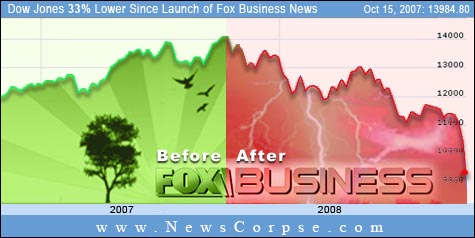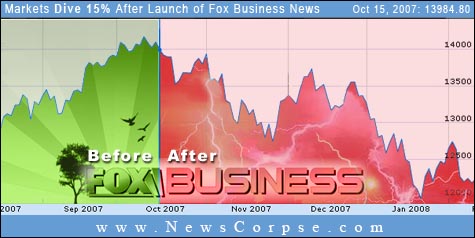It was one year ago today that the Dow Jones Company, parent of the Wall Street Journal, agreed to be acquired by Rupert Murdoch’s News Corp. That transaction marked another step in the shrinking universe of media ownership. Specifically, it was the consumption of a revered publishing institution by a voracious international megalopoly. So what did the Bancroft family and other shareholders get for their greedy acquiescence to the power-mad mogul?
One year ago, the $60.00 per share offer from News Corp was about a 67% premium over Dow Jones’ then current price. Anyone who immediately liquidated their holdings following the transaction (which no one did) would have made a nice profit. Everyone else just watched as their fortunes shriveled up. The parent of Fox News has declined 60% in the past year. That means that the $5 billion dollars spent on Dow Jones has a current value of $2 billion. That’s not a particularly impressive performance.
As for Murdoch’s financial fate, rather than adding a $5 billion asset to his empire, his company’s market cap declined $32 billion – that’s more than six times what he spent on Dow Jones.
Now it would be easy to blame this all on the economic collapse, and certainly that plays a significant part. The only problem is that News Corp fell further than any of its competitors.
| Company | % Decline |
| News Corp | 60 |
| New York Times | 55 |
| Washington Post | 50 |
| Time Warner | 44 |
| Dow Jones Index | 35 |
| Disney | 29 |
From a financial perspective, it doesn’t appear that the folks at Dow Jones made a particularly sound decision. While it’s impossible to say where these investments would be had News Corp not come along, it seems that they would have done no worse than the rest of the field. The difference is that they would still have their independence. They would not have had their publisher replaced by a Murdoch loyalist from England. And they would not have been ordered to shorten their stories and shift their focus from business to general news so that Murdoch could taunt his enemies at the New York Times (which he is also now rumored to fancy).
Murdoch’s business prowess is widely exaggerated. His New York Post has lost money for the past decade – the whole time he has owned it. And his celebrated purchase of MySpace when it was the unchallenged leader in social networking, hasn’t really worked out so well. MySpace is now second to a surging Facebook. Fox News itself is consistently the slowest growing news network on cable TV.
The biggest advantage for a Dow Jones tie in with News Corp was the potential for a television platform. The Wall Street Journal badly missed out by allowing CNBC and Bloomberg to run away with that market. Murdoch of course has his new Fox Business Network, but due to contractual commitments with CNBC, he is not permitted to use the DJ assets. And by the time those contracts expire, the dismally low-rated FBN may be history.
So…all in all, Dow Jones probably would have been better off if they had left well enough alone. They lost some prominent and experienced talent when Murdoch took over. And although he is moving slowly, so as not to spook his staff and subscribers, we can still expect him to put his personal stamp on the enterprise by dumbing down the content to reach a broader market. That’s been his M.O. throughout his entire career and there are no signs that he is abandoning his affection for tabloid sensationalism and rightist propaganda.




 The Fox Business Network
The Fox Business Network